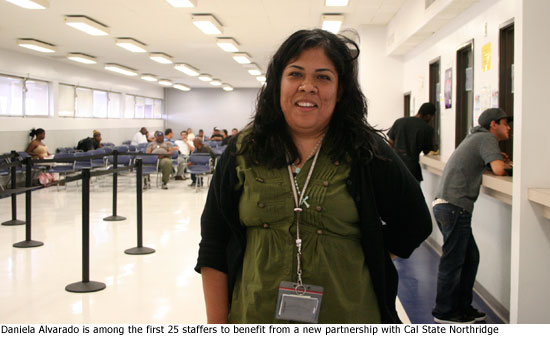A new way to master social work
June 4, 2010
Daniela Alvarado has had her sights set on a master’s degree in social work. But she knew she’d first have to quit her job as an intake worker in the county’s Department of Public Social Services to make that happen, a move she couldn’t afford.
Masters programs in social work are notoriously hard for full-time employees since, beyond a challenging course schedule, they demand hundreds of hours of field work.
But thanks to an innovative new partnership between the county’s welfare department and California State University at Northridge, Alvarado can now study and still work.
Starting in August, she will be part of the initial class of 25 Department of Public Social Services staffers starting a three-year master’s of social work curriculum that brings a classroom from Northridge to the department’s headquarters in the City of Industry, 40 miles away.
Even more important than the location, the new program tailors the difficult mix of classes and field work so students can juggle work and school in a hard but manageable six-day-a-week schedule.
“I can’t wait,” says Alvarado, 24, who currently determines eligibility for general relief applicants.
The curriculum and faculty will be identical to the program on CSUN’s campus, except that courses will be held on Saturdays. Meanwhile, the DPSS students will shift to a Monday through Thursday “4-40” schedule to keep Fridays free for field work internships.
The DPSS partnership with CSUN, unanimously approved this week by the Board of Supervisors, is the first time that the college’s social work department has taken a degree program off-campus to a government agency.
DPSS Director Philip Browning pushed for the partnership as a way to raise the department’s professional and educational standards.
“The master’s in social work degree will bring a new level of leadership and skill to the department,” says Browning, who has an MSW, as the degrees are known. “It’s going to be a really rigorous program.”
Currently, Browning says, “virtually none” of the department’s 700 social workers have a master’s in social work.
Browning expects the benefits will be felt first at the department’s In-Home Supportive Services division, which employs most of the social workers to run a state-funded program that provides 185,000 elderly or disabled residents with home-based care.
The new program follows on an earlier partnership, launched in 2006, that teamed DPSS with CSUN to help employees obtain a master’s in public administration. So far, there have been more than 50 MPA graduates.
Like the MPA program, the social worker program is cost free to the county. Students are responsible for tuition, estimated at $29,000 for the three years of study, plus expenses. Students can apply for the department’s tuition reimbursement of $750 per semester and seek financial aid through CSUN.
Already, there is a waiting list of more than 70 applicants. Another class of 25 will begin the application process for entry in the fall of 2011.
CSUN faculty members say they are impressed by the quality of the incoming class of DPSS workers. “The students are mature, diverse and really enthusiastic,” says Amy Levin, chair of the Northridge social work department. “We’re very excited about this program.”
Many of the incoming students are mid-career staffers in their 30s and 40s. The average age is 41, Levin says.
Patrick Muro, 49, is one of the older ones.
For years, he’s wanted to earn a master’s degree in social work, but couldn’t afford to leave a series of DPSS jobs, he most recent as an administrator for the In-Home Supportive Services program in Chatsworth.
“It’s great they are willing to be flexible to help us earn this degree,” say Muro. With six children, he says, he’s grateful for the flexibility.
Posted 6/3/10













 405 bridge work causes a stink
405 bridge work causes a stink
